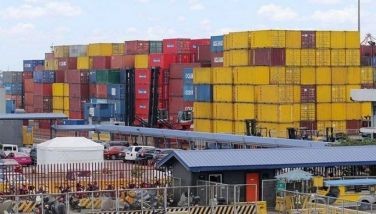Government lowers growth target due to crisis

The government has lowered even further its economic growth target for 2008 in the face of the financial crisis in the US.
Socioeconomic Planning Secretary Ralph Recto said yesterday that government planners now expect the country’s gross domestic product (GDP) to grow between 4.4 and 4.9 percent this year.
The figure is a further reduction from the 5.5- to 6.4-percent target set last month. The government originally forecast a GDP growth of 5.7 to 6.6 percent this year but has since downgraded this in the face of the rising prices of oil and food.
Recto said he expects Washington lawmakers to eventually pass a bailout package to stabilize the financial markets after the first was rejected Monday. But he said it may not be enough to prevent the US from going into a recession.
Such a development will affect the economy of the rest of the world including the Philippines, forcing the government to lower its growth targets, he warned.
“The Philippines, along with the rest of the world, will not be spared,” he said. “We are confident that our country will weather the storm. We have to downscale though our growth targets for 2008 and 2009.”
Worst case scenario
Other officials said Recto’s estimates were “medium-case scenarios”.
Under a worst case scenario, GDP growth could slide to 3.8 percent to 4.3 percent in 2008 and to three percent to four percent in 2009, Finance Secretary Margarito Teves said.
“For the worst case scenario to happen, the bailout plan in the US would have to be completely rejected,” Teves said. With only three months remaining in the year, the urgency of the US bailout plan was even more acute.
Teves said the 3.8-percent GDP growth scenario was also possible if the US slips into economic recession. “Not just a slowdown but a recession,” he said.
Teves said a US recession would have an effect not just on financial markets but on the real economy to the extent of exerting an impact on remittances from overseas Filipinos.
“A lot of our workers have two, sometimes even three jobs,” he said. “If the real economy starts getting affected, they would be losing one or two or maybe all their jobs and that would mean a decline in remittances.”
Since 18 percent of the country’s exports go to the US, Teves said an economic recession there would have a significant effect on the country’s production as well which in turn would affect domestic job creation.
“If there is recession in the US, there will be curtailment in the flow of funds as those with excess funds will be looking at economies with very safe instruments and very strong fundamentals,” he added.
According to Teves, the country was more likely to hit the midpoint between the best and worst case scenario where the GDP growth rate would be around 4.4 percent to 4.9 percent.
“The real situation we are looking at is the medium case,” he said. “But we are using worst case for planning purposes and to come up with action plan so that we are prepared in case it happens.”
Under the worst case scenario where growth would be nailed at 3.8 percent, Teves said the Department of Finance (DOF) projected a deficit level of P100 billion because of increasing public spending and declining revenues.
More likely, however, Teves said the fiscal deficit would be at around P75 billion. “We attached a high probability that the bail-out plan would be approved so the medium-case scenario is most likely.”
Teves said the Department of Finance would have to revisit its projections to determine how the emerging conditions would affect revenues and spending for the last few months of the year as well as 2009.
Teves said export growth projections would also have to be reviewed in the light of recent events as well as other assumptions used in the 2009 national budget which might have to be shifted as well.
“If we look at the medium case, we can handle the situation, we just have to really work hard,” Teves said. “Whether there is a bailout or not, there will be an effect on the financial market and the financial market really needs more capital.”
“That why even our medium case scenario is really not as good as before this happened,” he added.
Teves said the 2009 deficit projection would also depend on succeeding assessments although initially, the deficit level is expected to rise to P60 billion because of the preparations for the 2010 elections.
- Latest
- Trending




























